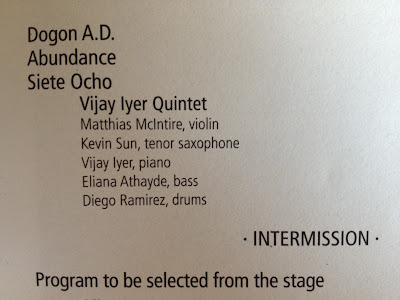Banff, Day 7 — Week 1
 | ||
| Look, Mom: I performed with Vijay Iyer! — "What's Vijay Iyer?" |
Why write difficult music?
A similar question came up in the first English class I took in college, which was amusingly titled "How to Scandalize Readers: Vladimir Nabokov's English Novels." In discussing novels like Lolita, Pnin, and Ada, or Ardor, the notion of hidden points of reference came up again and again—what Nabokov described in the afterward to Lolita as the "subliminal coordinates by
which the novel is plotted.” For Nabokov, the subtle details that hold his novels together formally aren't necessarily the point of reading his novels, i.e., our priority in reading his novels isn't to find these details. Instead, these subliminal coordinates provide a framework with which the novelist can operate with broad creative freedom to write works like Lolita—novels that are morally complex and layered with literary and cultural allusions, but read beautifully in themselves as a cohesive story.
To me, it seems that a commonplace objection to formally complex music (odd time signatures, "non-idiomatic" harmonies, etc.) is "What's the point?" The point of writing such music, I think, is to provide a framework within which musicians are forced to be creative, to respond to musical challenges that require unconventional or novel approaches to rhythm, melody, and harmony. Miles Okazaki mentioned this week that one effect of writing challenging music is to create a situation where musicians can't rely on devices that they've worked out in practice rooms and that they've come to rely on over standards and more familiar settings. It's related to his dictum on practicing: "If you sound good, you're probably doing it wrong." Although the Nabokov analogy only goes so far—the first adjective that comes to mind to describe his writing is "polished," which is the opposite of most improvisations over challenging music—the notion of a hidden formal framework, like in the form of a premise or conceit relating to rhythm, has been helpful for me when reflecting on what it is I imagine progressive musicians today are thinking about when approaching composition and trying to "push the music forward," to use a hackneyed but pretty apropos phrase.
The professor of this Nabokov class, Leland de la Durantaye, also mentioned something interesting regarding a "school" of experimental French writers in the 50s and 60s, known as the "Oulipo" group. He recalled how Georges Perec, the most famous proponent of this group of writers, wrote an entire novel (a couple hundred pages) in French without using the letter "e," which would be challenging in English, but is even more so in French (such is the drawback to having so many silent vowels). This kind of a literary challenge, called a lipogram, wasn't unheard of, but Perec published the novel, La disparition, without letting anybody know that he had written the novel with this formal constraint. Interestingly, no critics noticed that the most common letter in French was missing.
What's important here isn't that Perec accomplished some great technical feat, but that he pushed himself to be as resourceful and creative as possible to operate under such a hidden formal framework; in the same way, groups like Fieldwork create music that operates under some formal challenge—often a challenging time signature—but disguise this and attempt to create meaningful music under these constraints. I think it works well, and dispels the notion of elitist music that's "challenging for the sake of being challenging." It's music that is challenging for the sake of forcing musicians to explore uncharted territory and, in the process, produce music that is fresh and original, which is not to say polished necessarily, but at the very least something that we haven't heard before—to use Vijay Iyer's words, music that is "unique to its moment of creation."
***As an addendum, another point to be made about seemingly challenging music is that from one perspective, it might be considered "needlessly complex," but on the other hand, a lot of music that seems that way is really just unfamiliar. This is especially true for odd time signatures—as Miles and others pointed out, there's nothing intrinsically more challenging about playing in 5 or 7 or 21 than in 4—but also for other harmonic schemes or modes of playing.
***As an addendum, another point to be made about seemingly challenging music is that from one perspective, it might be considered "needlessly complex," but on the other hand, a lot of music that seems that way is really just unfamiliar. This is especially true for odd time signatures—as Miles and others pointed out, there's nothing intrinsically more challenging about playing in 5 or 7 or 21 than in 4—but also for other harmonic schemes or modes of playing.
Comments
Post a Comment